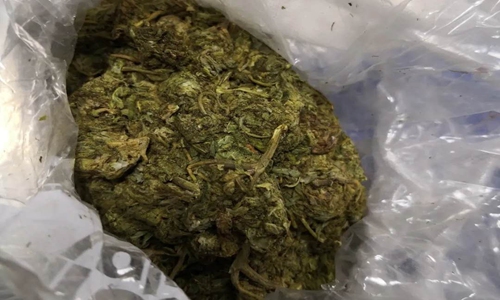
Guangzhou Customs seized 200 grams of cannabis in a case involving concealed drugs smuggled through an express channel. Photo: Courtesy of Guangzhou Customs
China will regulate all cannabinoid substances, the country's National Narcotics Control Commission (NNCC) announced on Tuesday. This makes China the first country in the world to do so, showing the country's continued efforts to crack down on new psychoactive substances, after it regulated all fentanyl-related substances in 2019.
Deng Ming, deputy head of the NNCC, said at a Tuesday press conference that China will add 18 substances, including synthetic cannabinoid substances and ketamine, to the narcotic and psychotropic drugs regulation list.
The regulation will take effect on July 1.
The official said that synthetic cannabinoid has became one of the most-abused new psychoactive substances. Cannabinoid substances pose a severe threat to society, said Deng, giving the example of Xinjiang, where the abuse of such substances gives rise to incidents such as intentional injuries and impaired driving.
Yu Haibin, a senior officer at the NNCC, said at the conference that the making and selling of cannabinoid substances have been on the rise in places such as Xinjiang. Since 2018, authorities in the region have cracked down on 301 such cases, arresting 390 suspects and seizing 15.75 kilograms of cannabinoid substances.
Substances were often disguised to look like the liquid used in e-cigarettes, Yu said, noting that the use of such substances can result in hallucinations, or even cause sudden death if used in excess.
The synthetic cannabinoids are highly camouflaged, as some are found in e-cigarette oil, and some are found in cut tobacco made from various flower petals, or plant stems and leaves. In Xinjiang, it has a commonly known nickname of "Natasha."
Compared with marijuana, synthetic cannabinoids, which are lab-made drugs originally designed to produce similar effects to cannabis, are cheaper, more addictive and more difficult to detect, which has led to the latter taking the place of traditional drugs. Recent years have witnessed increasing cases of synthetic cannabinoid abuse.
Synthetic cannabinoids found in China are both domestically made and smuggled in from other countries, Hua Zhendong, technical director of the NNCC national narcotics laboratory, told the Global Times.
Regulating cannabinoid substances is also in line with China's continuous efforts to crack down on new psychoactive substances, after it regulated all fentanyl-related substances in 2019.
Since 2001, China has regulated 188 new psychoactive substances, all fentanyl-related substances and cannabinoid substances.
Deng explained that due to China's timely legislation, strict law enforcement and international cooperation, the illegal production and export of new psychoactive substances have been curtailed.
Until the end of 2020, there are 1,047 new psychoactive substances globally, of which 450 emerged in the last five years.
Deng noted that regulating new psychoactive substances is an international issue, the solution to which cannot rely solely on one country.




